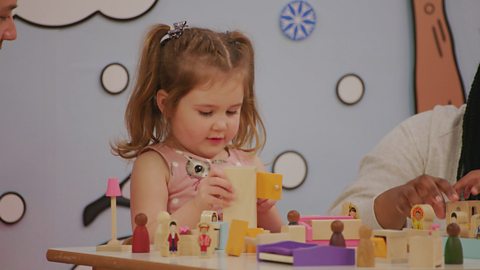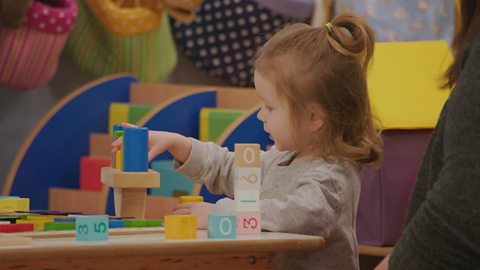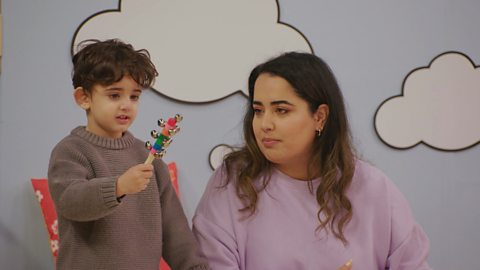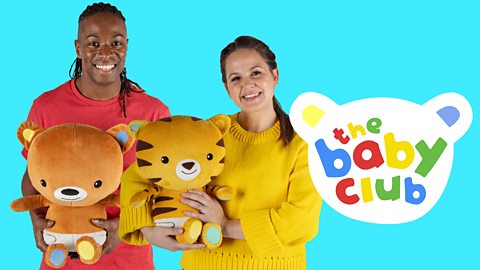Pretend play will be so important as your child grows into an adult.
The ability to make up a narrative and tell a story is something that is needed for your child to be successful at school and in their adult lives.
Who knew buying a toddler a teddy would be so beneficial to them as an adult?
Check out the video below to find out about all the amazing things your toddler will learn from their pretend play.
How about this car? How about that green car? Oh, look, there are lots in here. You're gonna put that one down the ramp?
Ramp?
Yes, it's gonna go whoosh. Whoosh
That's right, good boy.
(child indistinctly mumbling) (lady making plane sounds)
I think the airplane's going to land on the top.
(lady making beeping sounds) (upbeat music)
Ooh, what's that?
Mama's duck says quack quack quack.
Quack quack quack.
No ducks came back.
All the ducks came back.
All the ducks came back.
Yeah, all the ducks came back.
Mummy duck says quack quack quack.
(upbeat music)
Please may I have?
This is the kitchen.
What do you do in the kitchen?
Make food. Table. Mix it.
Are you preparing the food?
If they get tired, what do they do?
Yeah that's the bedroom. That's the pillow.
Where is the pillow?
Do you have a bench here as well? What do you do on a bench?
[Inaudible] table.
Oh! (upbeat music)
What are the benefits of pretend play?
- It allows children to experiment with language and words that they've heard.
- Through imaginative play, toddlers learn how to take turns and creatively problem-solve.
- It is a great opportunity to expose children to new vocabulary.
- Acting out scenarios helps children understand another point of view.

What are the stages of pretend play?
The language benefits of pretend play are wonderful but before your child can fully immerse themselves in imaginative play, they will need to be able to do the following:
- Large doll play - at around 14/15 months
- Small world play - at around 18 months
Large doll play
Large doll play is where a child plays with a teddy or a doll in a play setting.
This is important for boys and girls, as it allows your toddler to practice all the words they have heard in their environment.
This means they will practice everything they have heard you say to them. Your toddler will dress, cuddle, pat and care for their doll or teddy just like you care for them and use language as they do so.
If your toddler has a doll or teddy and you see them interacting with it, then this is the very early stages of pretend play!
Small world play
Once your toddler is comfortable with the larger dolls, introduce them to small world figures and see if they transfer their play onto the dolls.
Once a toddler realises that these little figures can be used as big real things they will be well on their way to using their imagination.
Your child will learn so many new words while they are playing with small world figures, and you can help them by naming what they are playing with.
Remember to name and comment rather than asking your toddler. It is not a test. Give them the words and it will be easier for them in the long run.

How to encourage pretend play with your toddler
Why not bring a doll or teddy along with you when you're out and about? Treat them like they are one of the family.
You could sit teddy at the dinner table, bring a doll on the bus, or put teddy in a trolly. Use language as you do this to help your toddler learn about lots of different social scenarios.
You can help your toddler use items on their teddy or doll, such as washing their face, feeding them with a spoon, or sharing some water (this can get a bit messy!).
If your child is not naturally seeking this type of play, there are ways you can encourage them. One thing you can try is pointing out something you know your child will identify on their teddy or doll.
You could say, ÔÇ£Look, mummyÔÇÖs nose, AliceÔÇÖs nose and teddy's nose,ÔÇØ pointing to each nose in turn.
Find out more about pretend play
Pretend play is great for your childÔÇÖs language and social skills. Check out the links below to find out more about why pretend play is so important:
- Dr Claire Halsey breaks down why imaginative play is so great for your child.
- Find out all about the science of pretend play.
- More activity ideas for pretend role play.
Want more? You can watch the full series of The Toddler Club on ┤¾¤¾┤½├¢ iPlayer right now!






